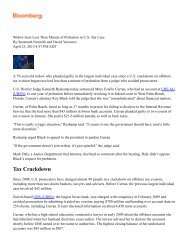Reply Memorandum of Law in Support of Motion to Correct Illegal ...
Reply Memorandum of Law in Support of Motion to Correct Illegal ...
Reply Memorandum of Law in Support of Motion to Correct Illegal ...
Create successful ePaper yourself
Turn your PDF publications into a flip-book with our unique Google optimized e-Paper software.
Case 2:83-cr-00314-GP Document 245 Filed 01/11/11 Page 8 <strong>of</strong> 13<br />
States v. Rose, 215 F.2d 617, 630 (3d Cir. 1954) - has long disapproved <strong>of</strong> general sentences<br />
<strong>in</strong> multi-count cases.<br />
As previously expla<strong>in</strong>ed, the Ward Court noted that the issue before it was Ward’s<br />
argument that his general sentence was both “illegal and contrary <strong>to</strong> the Sentenc<strong>in</strong>g<br />
Guidel<strong>in</strong>es.” 626 F.3d at 184 (emphasis added). The Ward Court held that Ward’s<br />
contention that his sentence was both “illegal and contrary <strong>to</strong> the Sentenc<strong>in</strong>g Guidel<strong>in</strong>es” was<br />
valid. In expla<strong>in</strong><strong>in</strong>g why Ward’s sentence was illegal, the Ward Court po<strong>in</strong>ted out that, just<br />
as <strong>in</strong> the pre-Guidel<strong>in</strong>es case <strong>of</strong> United States v. Pungi<strong>to</strong>re, 910 F.2d 1084, 1135 (3d Cir.<br />
1990), where the Third Circuit held that a general verdict <strong>of</strong> guilty is prejudicial <strong>to</strong> a<br />
defendant because it does not disclose whether the jury found the defendant guilty <strong>of</strong> one<br />
crime or <strong>of</strong> both, “as a result <strong>of</strong> the general nature <strong>of</strong> [Ward’s] sentence, neither we nor Ward<br />
can determ<strong>in</strong>e whether it was legal as <strong>to</strong> particular counts.” Id. The Ward Court further<br />
expla<strong>in</strong>ed, “We do not know whether the Court <strong>in</strong>tended <strong>to</strong> impose a 25 year sentence on<br />
each count <strong>to</strong> run concurrently which would clearly be illegal consider<strong>in</strong>g the statu<strong>to</strong>ry<br />
maximums on certa<strong>in</strong> counts - or whether the Court had some other sentence <strong>in</strong> m<strong>in</strong>d, and<br />
accord<strong>in</strong>gly ... we will remand for resentenc<strong>in</strong>g.” Id. Thus, the Ward Court pla<strong>in</strong>ly held that<br />
Ward’s “general sentence” was prohibited under both pre-Guidel<strong>in</strong>es and post-Guidel<strong>in</strong>es<br />
law. Notably, the defendant <strong>in</strong> Ward failed <strong>to</strong> object at sentenc<strong>in</strong>g but yet the Ward Court<br />
further recognized the enormity <strong>of</strong> the error and held that “general sentences” rise <strong>to</strong> the level<br />
<strong>of</strong> pla<strong>in</strong> error. Id.<br />
-8-










